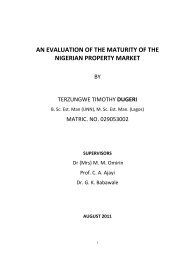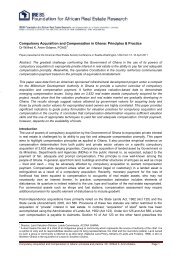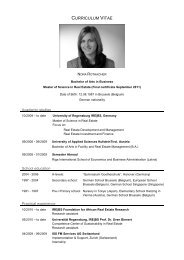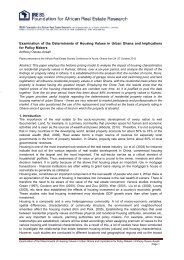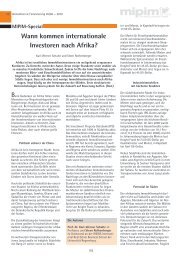You also want an ePaper? Increase the reach of your titles
YUMPU automatically turns print PDFs into web optimized ePapers that Google loves.
ZIMBABWESCANLEN AND HOLDERNESS LEGAL PRACTITIONERSFirm InformationWebsite address: www.scanlenandholderness.comLanguage spoken: EnglishContacts: Sternford Moyo and Joseph MafusireTelephone: +263 4 702561-8Fax: +263 4 700826/702569Email: moyos@scanlen.co.zw and mafusirej@scanlen.co.zwCountry InformationZimbabwe is a landlocked country spanning 390 757 squarekilometres. It has a population of approximately 11.4 millionpeople and more than 60% of the population is based in ruralareas.Economic IndicatorsThe gross domestic product (GDP) for 2011 was US$10.07 billionand is forecast to rise to US$ 11.9 billion in <strong>2012</strong>.Inflation RateYear on year inflation as at October 2011 was 4.2%.Investment ClimateZimbabwe is actively trying to attract foreign direct investmentas the country emerges from more than ten years of rapideconomic decline. It has established a ministry responsible forpromoting economic investment and the reintegration of theeconomy in the global market. Investment opportunities areopening up with the privatization of all state owned enterprisesin the iron and steel industry, road and rail transport,communications, agriculture, power supply and other sectors.The country is actively promoting bilateral investmentagreements with other countries and it has already signed onesuch agreement with South <strong>Africa</strong> which protects investmentsfrom compulsory expropriation. Investors must however takenote of the indigenisation laws which seek to promote theparticipation of indigenous persons in the economy.Forms of BusinessPrivate business corporationsPartnershipTrading trustCo-operativesMultinational CorporationsPrivate limited liability CompaniesPublic liability companiesSole proprietorshipCompany limited by guaranteeJoint venture.Formation of CompaniesCompanies and Private Business Corporations are registered andregulated by the Companies Act. Listed public companies are inaddition regulated by rules of the Zimbabwe Stock Exchange.There is a central registry of companies in Harare and a branchregistry in Bulawayo. Most entrepreneurs avoid the registrationprocess by buying existing shelf companies from law firms.Exchange ControlsExchange control laws are in force but their implementation iscurrently suspended because the country is using currencies ofother countries. Dividend remittances in respect of projectsapproved by the Zimbabwe Investment Centre are allowed at100% of current after-tax revenue profits. Capital is blocked andmay be remitted through 20 year government bonds. Capital ispaid in 10 equal annual instalments at the end of years 11 to 20.Interest is 4% per annum, tax free and payable half yearly.TaxationThe corporate tax rate is 25% plus a 3% aids levy. A levy of 5% isimposed on the net financial profits of registered bankinginstitutions.Value added tax (VAT) of 15% is chargeable on the sale of goodsor services.Profits earned from new projects by companies or individualsoperating in designated growth point areas are taxed at 15% inthe first year in which the operations commence and for fouryears thereafter.Tax concessions are also applied to export manufacturingbusinesses established in designated export processing zones.Dividends paid by a Zimbabwean company to anotherZimbabwean company are not taxable, but dividends earned bynon-residents in Zimbabwean companies are subject to awithholding tax of 15% in the case of stock exchange listedcompanies and 20% in the case of other companies.Capital gains tax is levied on the sale of immovable property atthe rate of 20%. The rate is 5% on immovable property acquiredby the seller before February 2009. Capital gains tax onsecurities is 1%.Double taxation agreements exist with Bulgaria, Canada, France,Germany, Malaysia, Mauritius, Netherlands, Norway, Poland,South <strong>Africa</strong>, Sweden, the United Kingdom and Yugoslavia.Import/ExportImport controls exist. Zimbabwe is a member of the GeneralAgreement on Tariffs and Trade (GATT). Government hasremoved duty on imports, equipment and raw materials meantfor local industry to promote productivity. Duty on importedcommercial motor vehicles has also been reduced to boost thetransport and business sector.Monetary PolicyZimbabwe suspended the use of the local currency in February2009 in a bid to restore economic stability and stem rampantinflation. Trade is now being conducted in the currencies ofother countries with the main ones being the United Statesdollar and the South <strong>Africa</strong>n rand. The move has stabilized theeconomic environment and reduced inflation to single digitfigures.Legal SystemThe legal system is based on the Roman-Dutch common law asmodified by statute. The highest court in the land is theSupreme Court followed by the High Courtand then the Magistrate’s Court. There arealso specialised courts like the AdministrativeCourt and Labour Court.Intellectual PropertyProtection is provided by the Patents and87




